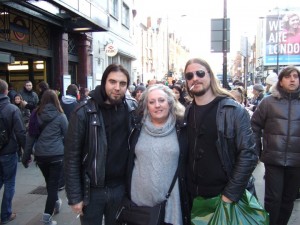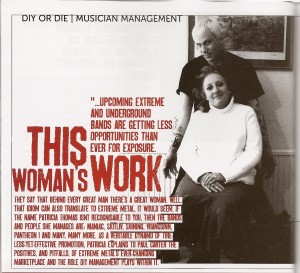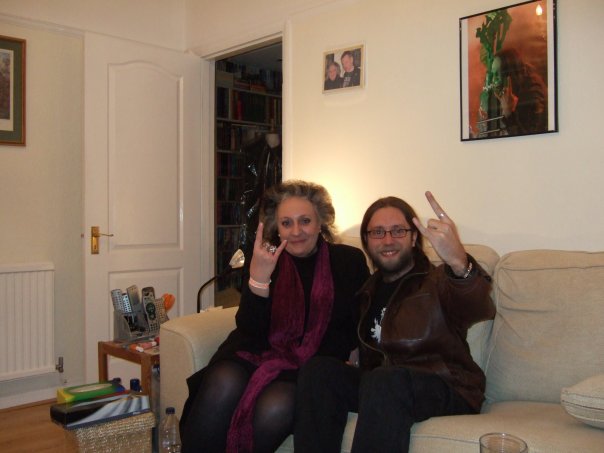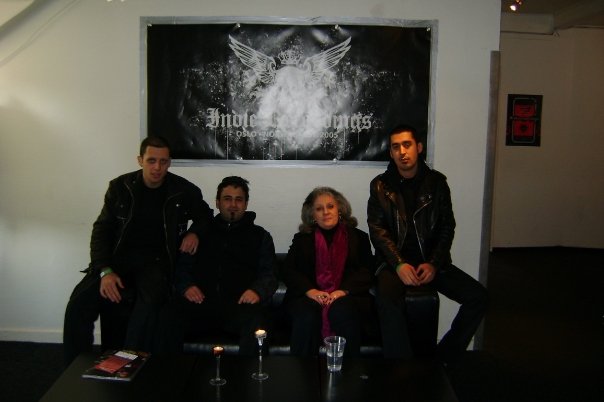Black Metal scene has its own influencers… Musicians, authors, managers, organizers, promoters… Let’s delve into this enchanting darkness to know more about one of these profound characters; Patricia Thomas.
You have been running Patricia Thomas Management more than 10 years. Could you please tell us how you decided to do an extreme metal management?
It was purely accidental. I was a big Black Metal collector and came into contact with bands through that. Some of them asked me to help them out with various things, and it just grew from there.
What kind of jobs did you do before you found Patricia Thomas Management?
I worked on the personnel side for the Italian car manufacturer Alfa Romeo for several years. I then went on to work with a very well known Middle Eastern writer and political commentator and from that moved on to working with a Saudi Prince, and then for his nephew. All of that took 15 years, then I moved on topension investmentsector for I think it was seven years until the market crashed, and now here I am.
You are working with the bands’ of Dark Essence Records. How many bands are there in Patricia Thomas management recently?
I usually have a core of around 15 bands, with some of them being active all the time, and some who are dormant for long periods of time, so out of those 15 I’m probably busy with around 6 at any one time. It sounds a lot for one person, especially with all the Dark Essence and Karisma Records bands as well, but you must bear in mind that not all bands are constantly busy, so there are often periods where there is very little to do for some bands (and periods where you are so busy you don’t know where to turn). But on the whole it’s manageable.
What was the very first moment of yours that made you fall in love with black metal?
I probably started to fall in love with it even before it existed and I blame Alice Cooper for that. I went through several years where I was too busy to really listen to too much music, but after I stopped working for the Arabs I had time on my hands to explore what was happening on the scene, and I came across Cradle of Filth. I can’t say I liked all them all that much, or for any length of time (they’re way too “Gothish” for me), but it was enough to make me curious and want to find out more.
What does black metal mean to you?
Being yourself, away from the herd mentality, and not caring what anyone thinks of you. Sadly, a large section of today’s fans have totally misunderstood the genre and have turned it into the very thing it sought to oppose. I can’t stand the idiots who think that to be a Black Metal fan a band has to wear corpse paint as if it was a uniform, and ONLY Black Metal played in a certain way and by certain bands is acceptable. Bands who, incidentally, have themselves changed totally over the years. Those fans have become the sheep the rest of us despise.
Metal management has been improved a lot lately in digital era. Besides the proper advertisement came into prominence due to the growing number of bands in the scene. What are the pros and cons of management?
I don’t think it’s actually been improved, it’s just been made easier on a day to day basis, but independent operators these days find it virtually impossible to earn a living that would allow them to pay the mortgage, bring up a family etc., without having a “day job”. Illegal downloading killed it for everyone – the bands, the managers, the venues, the labels, the studios, the promoters. Those “fans” who feel it is their entitlement to have whatever they want for free have caused closures and job losses not just within the industry but also within those sectors who provide support for the industry, as well as hardship for the bands themselves.
You have been doing management of two unpredictable and also sophisticated characters from black scene as Maniac (Mayhem, Skitliv) and Niklas Kvarforth (Shining, Skitliv). How do you cope with the chaos then and what makes you appreciated regarding these two musicians?
I consider both Maniac and Niklas to be amongst my very best friends. I’ve known Maniac for many years now, well before I started working for him, and even then everything you heard about him was grossly exaggerated. He’s an immensely intelligent man, I would say one of the few true intellectuals in this business. His “wild” youth is long past him now and he’s a happily married and very devoted family man. He is extremely professional when it comes to his music.
It was Maniac who introduced me to Niklas, seems like an eternity ago, and asked me if I could help him out with a few things, and I’ve been with him since then. Working with Niklas can be a wild ride now and then, but when it comes to his music and the business side of things he is 100% professional and totally committed. More so than most. Again, what you hear about him is grossly exaggerated and a lot of the timeit’s just lies from people with a grudge against him or who want their 5 seconds of fame and who can only achieve it by trolling.
I also think that some music fans fail to realizethat musicians are performers. You wouldn’t expect Ian MacKellen to go home and behave like Gandalf once the day’s filming was finished, so why do people think that musicians go home and behave like they do on stage?
What do they appreciate about me? Maybe it’s my age, and they know I’m not doing it for the glory or to try and get into their pants. Maybe because I don’t put up with any “nonsense” and I’m quite happy to shout at them like a demented school teacher if I think they’ve messed up. Who knows? You’d have to ask them.
In 2014, we translated Niklas’ book “When Prozac No Longer Helps” into Turkish with poet Altay Öktem from Marjinal Books Publishing House and organized a signature daywith the presence of Niklas including many crazy photos, video interview. As you are his manager, how did you find this cooperative work and premiere?
I am his manager, but I think of that as an “honorary” title. I tend to do mainly the PR side of things and act as an advisor. There is only one person who manages Niklas and Shining, and that is Niklas himself. I wasn’t involved in the book signing session, so I can’t really comment about that but I know that it was well organized and successful.
You are working with underground bands which can be counted as rebellious act against mainstream media. Why do you choose to work with underground bands? How do you draw the line for being underground?
I don’t distinguish between underground, mainstream or anything else to be honest. That whole “rebellious” thing has become a myth these days. I get dozens and dozens of emails every week from “underground” bands wanting me to advise them how to get a big record deal and how to get themselves into the press or lots of gigs. Most bands would love to have a substantial record deal and extensive media coverage. It just so happens that the bands I work with all fall into the “underground” category for whatever reason, usually that they are not signed to one of the big labels. There’s very little of what people call mainstream stuff these days that interests me, if any – I’m still stuck in the Woodstock era and the era of bands like I like “growing” a band. The idea of working with some hugely well-known band is not something that I would find particularly satisfying, it would feel too impersonal. As well as the fact that big mainstream bands require big mainstream agencies to handle them – I just don’t have that kind of infrastructure, nor would I want it.
What are the criterions you look for when you start to work with an underground band?
The main two criteria are firstly that I have to like the music and would listen to it myself, and secondly that I have to like and respect the people I’m working with. I don’t care if you have the best sound ever, if I think you’re a twat, I won’t work with you. I also prefer bands who have a realistic view, and who are prepared to work hard. I will never waste time on any band who thinks they are going to get a big money record deal immediately, who expect to play big festivals even though they don’t have an album out, or come to that, have never even played live, and who expect to be millionaires inside of a year.
Do you choose the bands which you wanna work with or do they come with an offer to you?
I don’t think I’ve ever approached a band. They’ve always come to me. To me that shows that a band is serious in wanting to progress.
You are mainly working with black metal bands so do you think the scene is on the rise, fall or standstill?
Right now it seems to be at a standstill. There are too many bands out there (in all genres). Anyone with a computer and absolutely zero musical or writing skills can form a “band” and “release” an album. I think fans have reached saturation point and are tired of listening to stuff that is of such poor quality that it doesn’t deserve to be heard and would never get a recording deal. It’s turning people off and they are sticking with bands who have a proven track record who have been around a long time. It’s a shame because there are many talented new bands out there but they just get lost in all the crap we’re bombarded with.
Episode 13 from Turkey in under your management. How are things going with the band?
I haven’t heard from the band in a few years now. Some of the members settled down to jobs I believe which is one of the main causes of bands becoming silent. They were a phenomenally good Black Metal band. The Norwegian audiences are extremely hard to please when it comes to Black Metal from other countries, but their appearance at Inferno a few years back won them a lot of Norwegian fans.
Which bands would like to work with?
The Scottish/Gaelic band Runrig. They’ve been going for well over 40 years now and I’ve been a fan since virtually day one. And the Bands of HM Royal Marines. They’re superb and versatile musicians and are also on active military duty. Their organization is second to none which would be a big bonus given the way the music business normally operates.
What would your advices be for the newly-flanged bands in the underground scene?
Make sure you know how to write music and play instruments – don’t rely on computers, be a real musician. And never, ever, try to copy anyone else. Find your own style and be yourself. Work very hard, expect to have to make quite substantial financial sacrifices and sacrifices in your home life, and follow your dream.
 Do you like to show up festivals or shows of your bands?
Do you like to show up festivals or shows of your bands?
Not much these days. I go to see any of my bands who come over to the UK obviously, and I usually travel to Norway for Inferno,but I hate big outdoor festivals and would never go to one. I prefer the intimacy of club shows.
As I saw that you have profession on Italian dialects like Tristine, Friulian, Venetian which are belong to different parts of Italy. Is it a sort of interest in Italian linguistics or there were times that you had been living at there?
Those three dialects are all from the same area of the North East of Italy. Trieste is the dialect of the town of Trieste, Venetian of Venice, and Friulano of the Friuli region. My mother was from Friuli, I was born in Trieste when my father was stationed there with the British army and I’ve spent a lot of time in Venice. I spoke Italian before I spoke English in fact.
Speaking of Italy, I would like to ask if you are into Italian wine and which region is your favorite.Besides wine culture overall is popular in UK as it is well known with degustation events, wine & spirit qualification center WSET.
Although I do have a good knowledge of wines, having spent so many years working with VIPs, and having family who own vineyards, I actually don’t drink at all. I hate the taste of alcohol. If I was pushed to drink, I prefer French wines. A Cheval Blanc for white, a PichonLalande for Red, and for a dessert wine I’d probably opt for the Italian Picolit, which is actually from my area in Italy.
What other genre of music can take your attention rather than black metal?
Like a good many of the musicians I work with I have very eclectic tastes and actually hardly ever listen to Black Metal outside of the bands I work with any more.I listen to a lot to classical music, music from the 30’s and 40’s, Swing, Blues, Folk, New Country and Cajun. I’m not defined by the music I listen to. I listen to whatever I like and whatever I’m in the mood for at any given time.
There are book projects, symposiums regarding contemporary black metal in academic way in UK; one will be on November 2016. Also a research group The Performances of Everyday Living at the University of Southern Denmark has contributions to these events. What do you think about these studies on black metal from UK?
It’s not something that particularly interests me. Black Metal, or any kind of music come to that, is about the emotions it stirs up in the individual. Dissection and analysis is for those who want to dissect and analyze as opposed to living and breathing it, and it would take a hell of a good speaker, and one with in-depth knowledge to make it interesting to me. Since most studies are simply the opinion of whoever writes them, or they are a particular axe that someone wants to grind, I’ve become very jaded about that kind of thing, and, being closely connected to the REAL people on the scene, i.e. the musicians themselves, I know what a lot or inaccurate things have been written.
 How do like literature? Do you have favorite authors, masterpieces which you turn back many times in your life?
How do like literature? Do you have favorite authors, masterpieces which you turn back many times in your life?
I’m passionate about literature. My favorite writers are Tennessee Williams, F Scott Fitzgerald, Kipling, Tolkein, oh, too many to mention. I also read a lot of poetry, I always have a poetry book by my side, and a lot of military history – First World War and the Jacobite Rebellions being my main areas of interest.
Have you ever thought to do a management for artists rather than musician, say an author in the future?
No. It requires a totally different expertise and skill sets, as would classical music, and I would never presume to offer my services to someone when I know nothing about the field in which they operate.
How do you know Turkey? Have you ever been in here?
I’ve never been to Turkey and I don’t know it at all other than what I see in the news. I think you are going through a particularly difficult time now, and my thoughts are with those who died in the recent bombings.
Thank you very much for the interview. Please share your last words with Filhakikat readers.
Listen to music because you like it, whatever genre it is. Don’t be forced into listening to one type only. It doesn’t matter what anyone else thinks or your choices. In terms of what you listen to, you are the only one you have to please.
Interviewed by Zeynep Çolakoğlu




